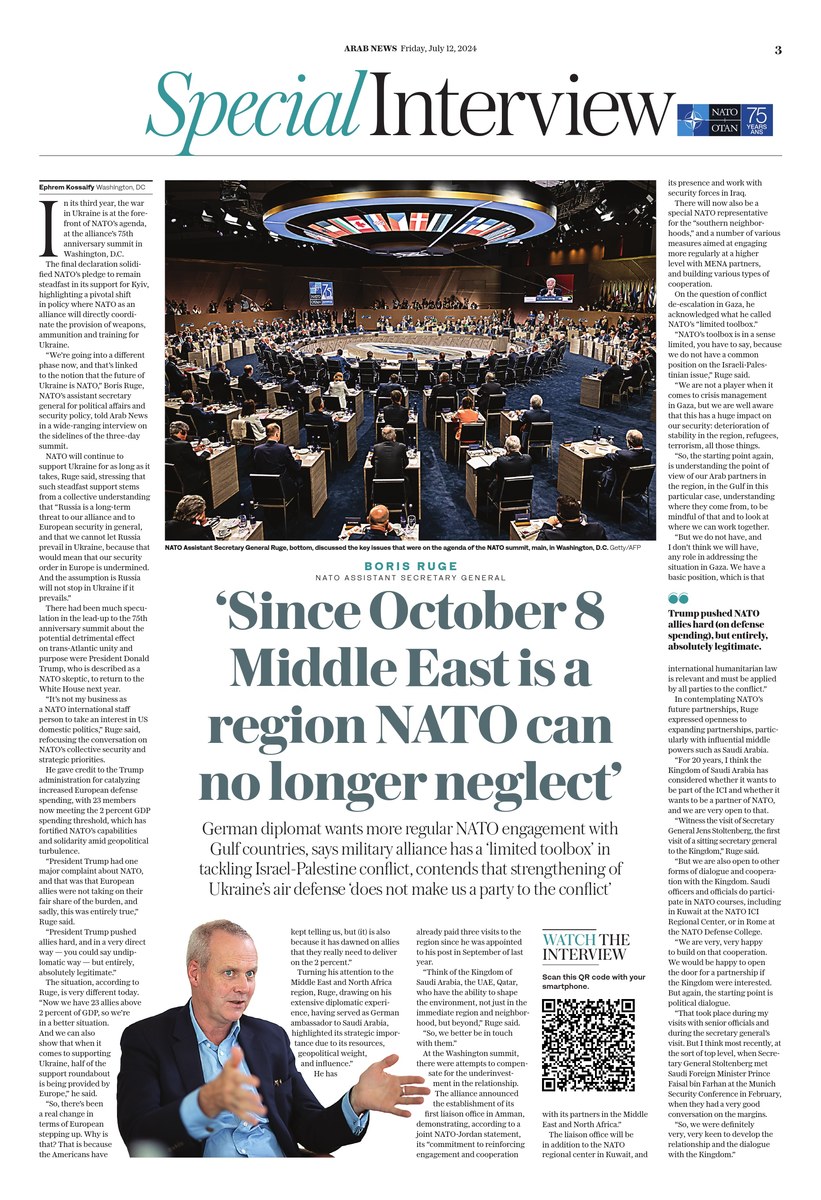WASHINGTON, D.C.: In its third year, the war in Ukraine is at the forefront of NATO’s agenda, at the alliance’s 75th anniversary summit in Washington, D.C.
The final declaration solidified NATO’s pledge to remain steadfast in its support for Kyiv, highlighting a pivotal shift in policy where NATO as an alliance will directly coordinate the provision of weapons, ammunition and training for Ukraine.
“We’re going into a different phase now, and that’s linked to the notion that the future of Ukraine is NATO,” Boris Ruge, NATO’s assistant secretary general for political affairs and security policy, told Arab News in a wide-ranging interview on the sidelines of the three-day summit.
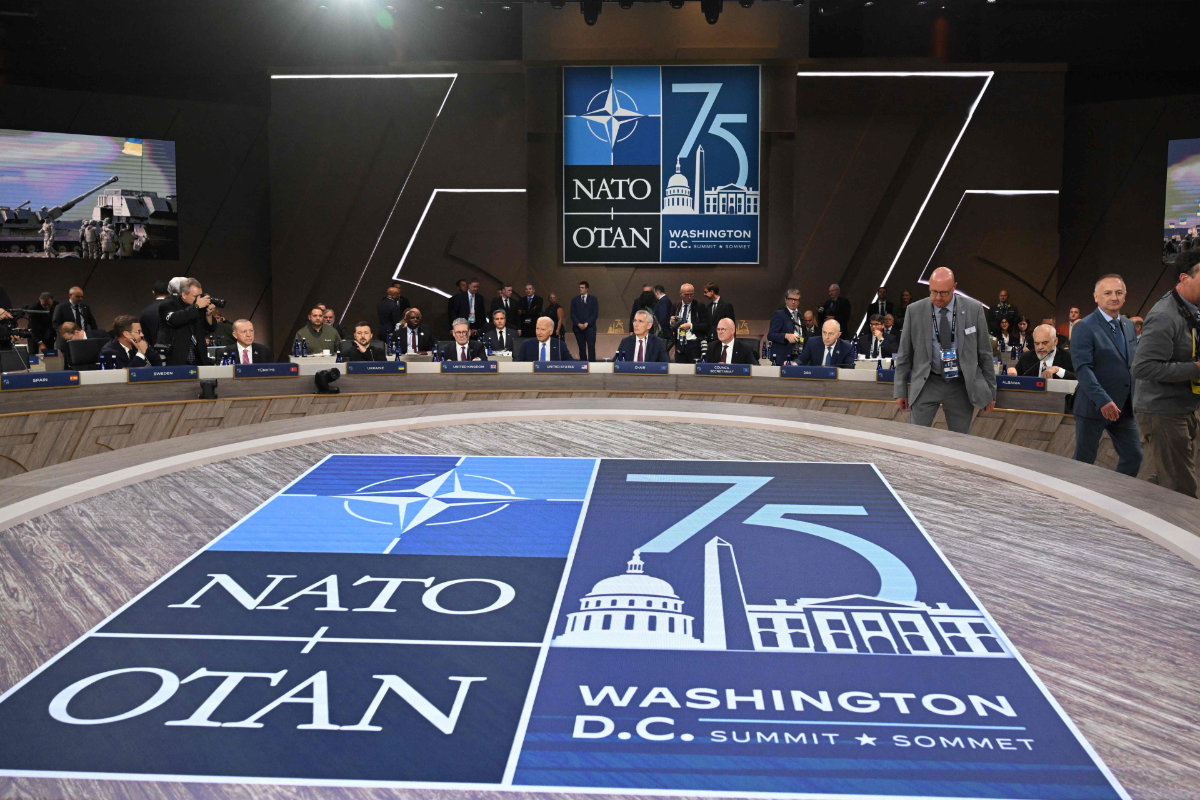
General view of the NATO-Ukraine Council during the NATO 75th anniversary summit at the Walter E. Washington Convention Center in Washington, D.C., on July 11, 2024. (AFP)
NATO’s commitment to supporting Ukraine is reinforced by a significant financial package of 40 billion euros and the establishment of a Joint Analysis, Training, and Education Center (JTEC) in Poland, alongside bolstering Ukraine’s air defense capabilities.
The US, Denmark and the Netherlands announced on Wednesday that the transfer of F-16 jets had begun and that UKraine will be flying operational F-16 this summer. This has been a key request by Kyiv, which wants advanced aircraft as it strives to gain parity in the skies with Russia.
Ruge said that the urgency of fortifying Ukraine’s defenses against aerial threats was underscored on the eve of the summit when Russia fired a barrage of missiles on several Ukrainian cities, killing dozens, including in Kyiv where a children’s hospital was reduced to rubble.

Turkey's President Recep Tayyip Erdogan, Ukraine's President Volodymyr Zelenskiy, NATO Secretary General Jens Stoltenberg and British Prime Minister Keir Starmer talk before a session during NATO's 75th anniversary summit in Washington, D.C., on July 11, 2024. (REUTERS)
“These guys desperately need more air defense. That’s part of the package,” he said.
“It does not make us a party to the conflict. We’re supporting Ukraine in its exercise of self-defense under Article 51.”
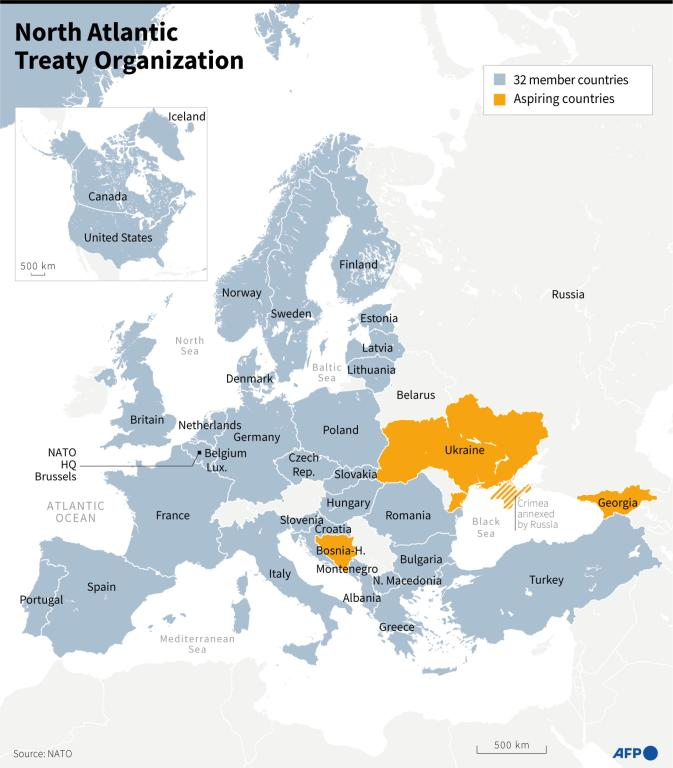
NATO will continue to support Ukraine for as long as it takes, Ruge said, stressing that such steadfast support stems from a collective understanding that “Russia is a long-term threat to our alliance and to European security in general, and that we cannot let Russia prevail in Ukraine, because that would mean that our security order in Europe is undermined. And the assumption is Russia will not stop in Ukraine if it prevails.”
There had been much speculation in the lead-up to the 75th anniversary summit about the potential detrimental effect on trans-Atlantic unity and purpose were President Donald Trump, who is described as a NATO skeptic, to return to the White House next year.
“It’s not my business as a NATO international staff person to take an interest in US domestic politics,” Ruge said, refocusing the conversation on NATO’s collective security and strategic priorities.
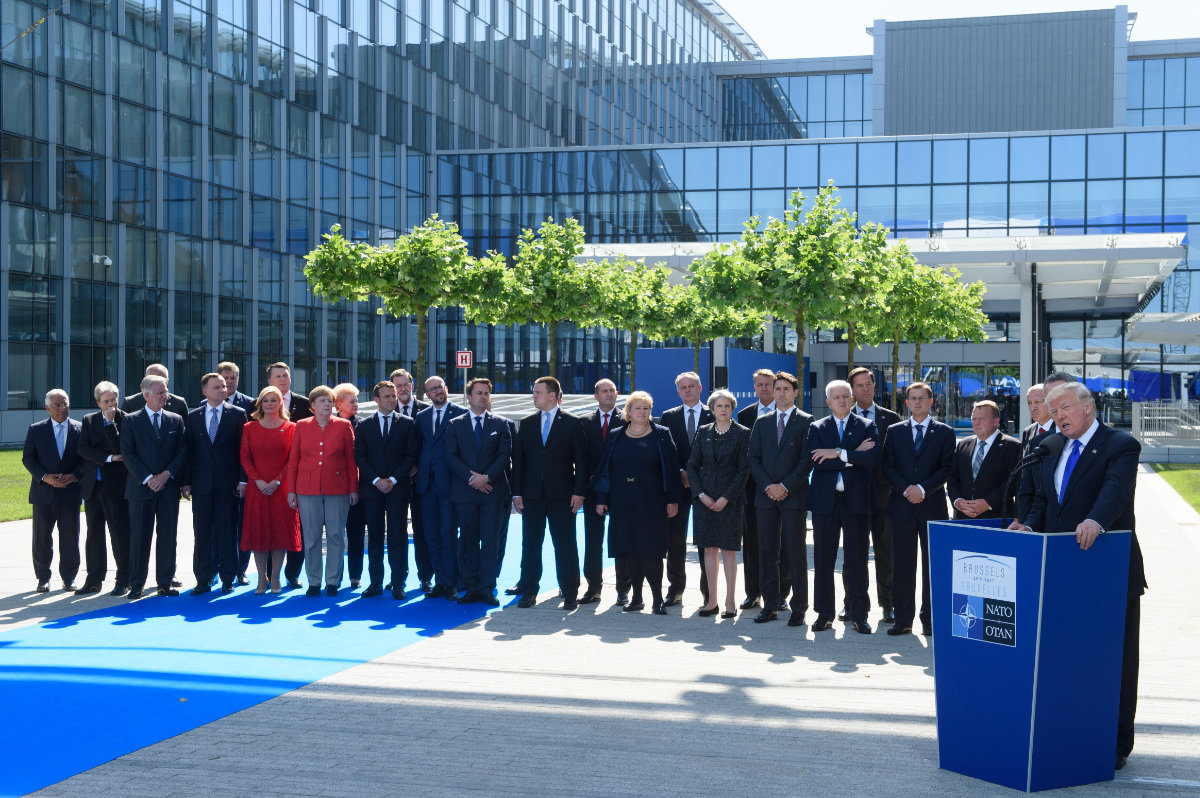
In this photo taken on May 25, 2017, US President Donald Trump (R) delivers a speech as NATO heads of governments listen during a ceremony at the new NATO headquarters in Brussels. (AFP)
He gave credit to the Trump administration for catalyzing increased European defense spending, with 23 members now meeting the 2 percent GDP spending threshold, which has fortified NATO’s capabilities and solidarity amid geopolitical turbulence.
“President Trump had one major complaint about NATO, and that was that European allies were not taking on their fair share of the burden, and sadly, this was entirely true,” Ruge said.
“President Trump pushed allies hard, and in a very direct way — you could say undiplomatic way — but entirely, absolutely legitimate.”
The situation, according to Ruge, is very different today. “Now we have 23 allies above 2 percent of GDP, so we’re in a better situation. And we can also show that when it comes to supporting Ukraine, half of the support roundabout is being provided by Europe,” he said.
“So, there’s been a real change in terms of European stepping up.
“Why is that? That is because the Americans have kept telling us, but (it) is also because the security situation in Europe after the full-scale invasion is such that it has dawned on allies that they really need to deliver on the 2 percent. So, two-thirds of our allies are now 2 percent-plus, and we will continue to push the allies who are not there to get there.”
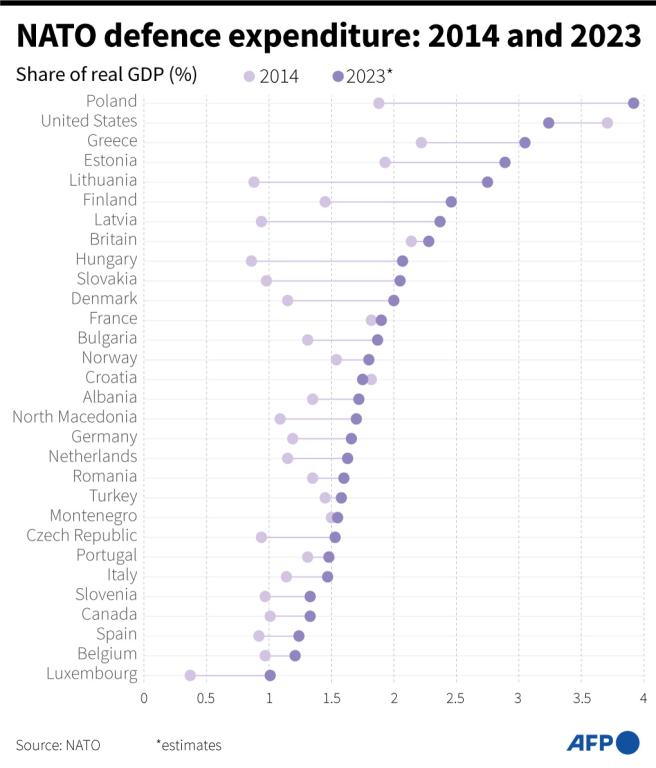
Turning his attention to the Middle East and North Africa (MENA) region, Ruge, drawing on his extensive diplomatic experience, having served as German ambassador to Saudi Arabia, highlighted its strategic importance due to its resources, geopolitical weight, and influence.”
He has already paid three visits to the region since he was appointed to his post in September of last year.
“Think of the Kingdom of Saudi Arabia, the UAE, Qatar, who have the ability to shape the environment, not just in the immediate region and neighborhood, but beyond,” Ruge said.
“So, we better be in touch with them.”
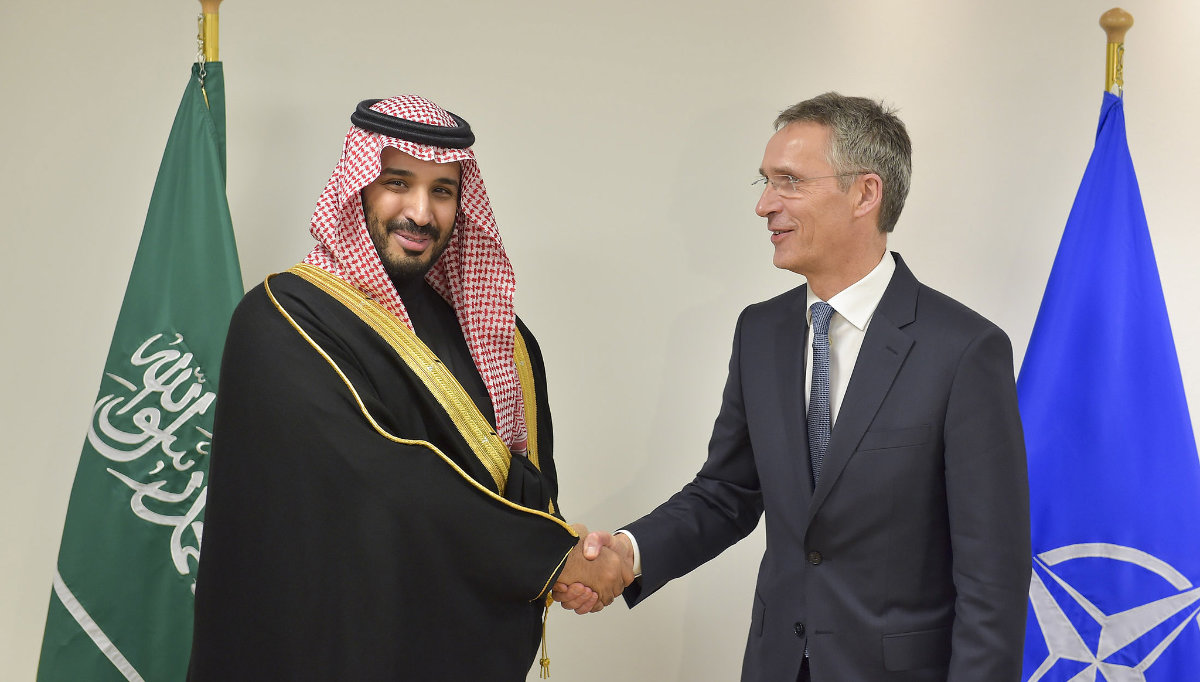
Saudi Arabia's Crown Prince and Prime Minister Muhammad bin Salman with NATO Secretary-General Jens Stoltenberg. (NATO photo/File)
Ruge is candid about the reasons why NATO-Gulf cooperation has yet to achieve its full potential.
“I would say, somewhat self-critically, since the first Russian invasion of Ukraine (in 2014), we’ve been super focused on Russia, Ukraine, deterrence and defense. And because we were so absorbed in this immediate issue, we have not invested enough into the relationship with our Gulf partners,” he said.
At the Washington summit, there were attempts to compensate for the underinvestment in the relationship. The alliance announced the establishment of its first liaison office in Amman, demonstrating, according to a joint NATO-Jordan statement, its “commitment to reinforcing engagement and cooperation with its partners in the Middle East and North Africa.”
The liaison office will be in addition to the NATO regional center in Kuwait, and its presence and work with security forces in Iraq.
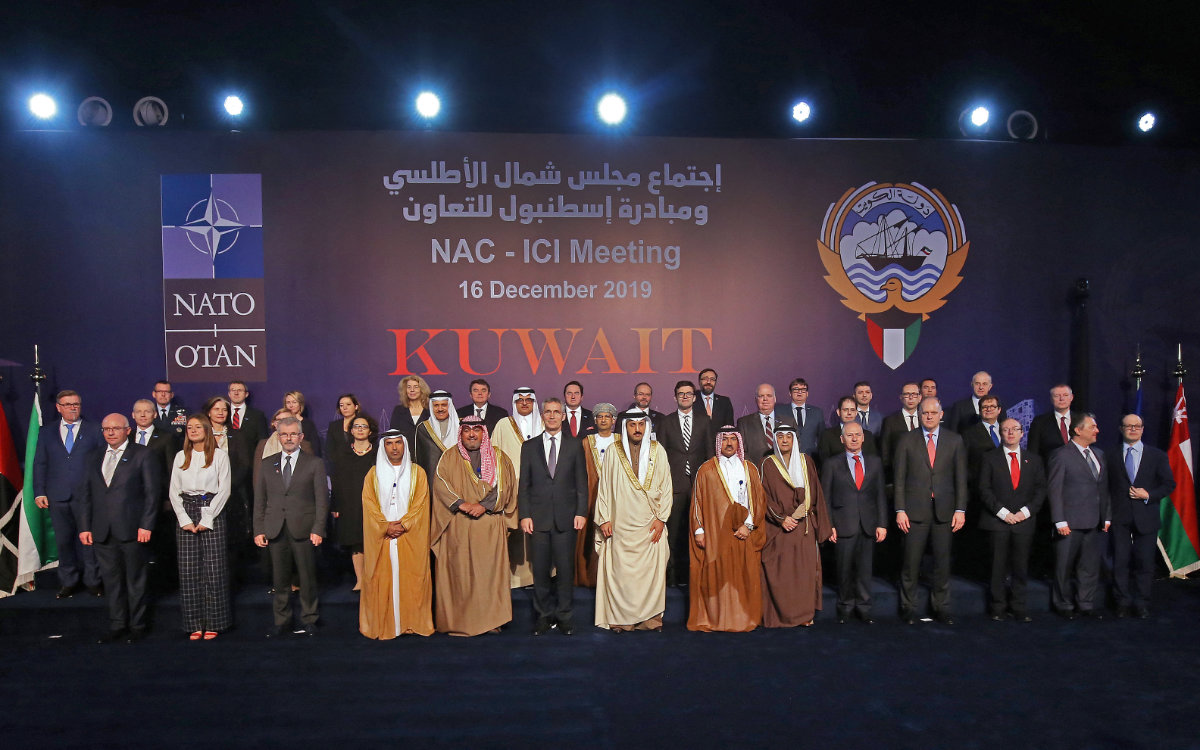
This photo taken on December 16, 2019, shows NATO and Kuwaiti officials during the NAC-ICI meeting to celebrate the 15th anniversary of the Istanbul cooperation initiative in Kuwait City (AFP/File).
There will now also be a special NATO representative for the “southern neighborhoods,” and a number of various measures aimed at engaging more regularly at a higher level with MENA partners, and building various types of cooperation.
Four of the six GCC are members of the Istanbul Cooperation Initiative — the UAE, Qatar, Bahrain and Kuwait.
Established in 2004, ICI is a platform through which NATO and MENA partners can meet and discuss security issues of common concern.
The latter include, as reflected in the summit’s declaration, irregular migration (“that’s a big one,” said Ruge) climate change, counterterrorism, the threat of a nuclear Iran, and Iran as a “destabilizing factor in the region” and “a supporter of the Russian war effort.”
“Iran is very much on our radar,” Ruge said.

Boris Ruge, NATO's assistant secretary general for political affairs and security policy. (Photothek via Getty Images/File)
He underscored NATO’s commitment to countering terrorism and enhancing regional security architectures through initiatives such as the ICI and Mediterranean Dialogue.
These programs, tailored to individual partner countries, aim at facilitating military interoperability and capacity-building, underpinned by robust political dialogues.
Ruge envisions future enhancements to these initiatives, advocating for broader participation and deeper and more regular high-level engagement with partner nations to mitigate shared security threats across the Mediterranean and MENA regions.
“The most important thing for me is to start with an improvement, a strengthening of the political dialogue, and everything else flows from there.
“So, cooperation, in terms of military interoperability, the participation of officers from these countries in NATO courses, NATO exercises, all super important, but it starts with a proper political dialogue.”
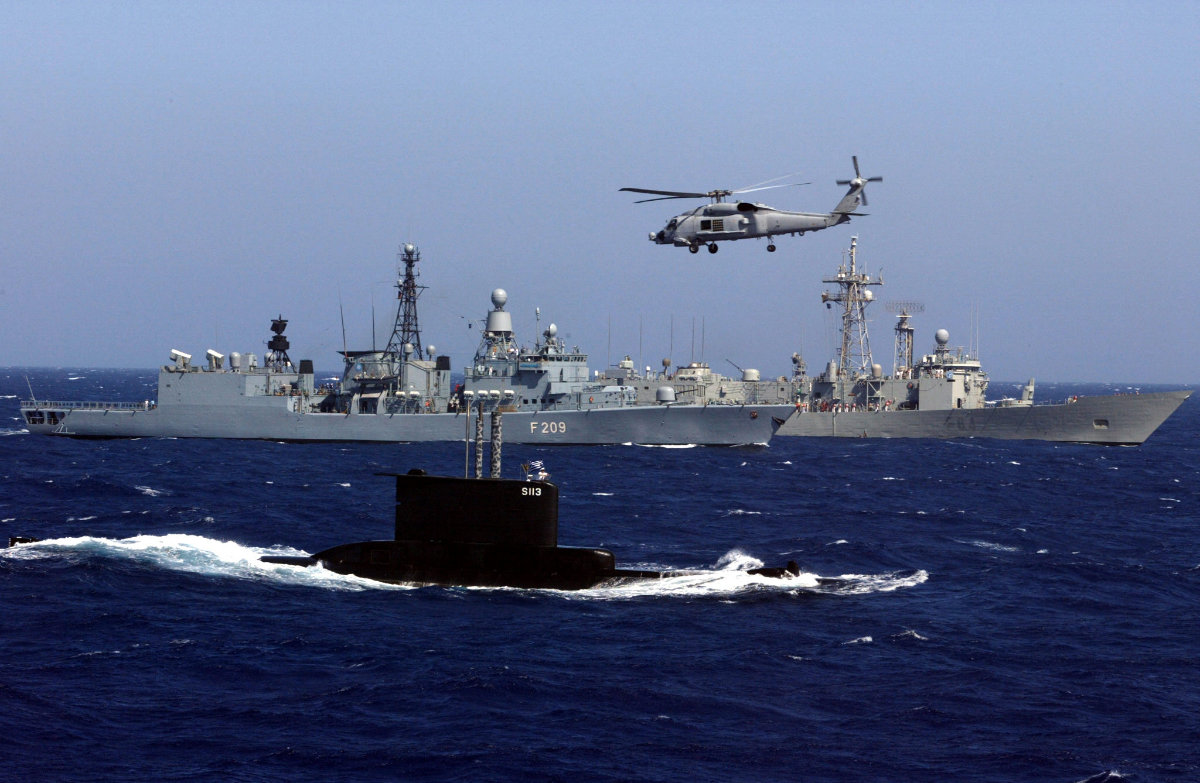
NATO forces conduct a military exercise in Mediterranean waters in this file photo. (AFP)
Reflecting further on the importance of MENA, Ruge said: “Anyone who thought that this was a region that we could neglect woke up on the eighth of October to see that this is a region that we have to keep in touch with.”
On the question of conflict de-escalation in Gaza, he acknowledged what he called NATO’s “limited toolbox.”
“NATO’s toolbox is in a sense limited, you have to say, because we do not have a common position on the Israeli-Palestinian issue,” Ruge said.
“We are not a player when it comes to crisis management in Gaza, but we are well aware that this has a huge impact on our security: Deterioration of stability in the region, refugees, terrorism, all those things.
“So, the starting point again, is understanding the point of view of our Arab partners in the region, in the Gulf in this particular case, understanding where they come from, to be mindful of that and to look at where we can work together.

Palestinians make their way past destroyed buildings following a two-week Israeli offensive in the Shujaiya neighbourhood, east of Gaza City, on July 11, 2024. The civil defense agency in Hamas-run Gaza said on July 11, that around 60 bodies have been found. (AFP)
“But we do not have, and I don’t think we will have, any role in addressing the situation in Gaza. We have a basic position, which is that international humanitarian law is relevant and must be applied by all parties to the conflict.”
In contemplating NATO’s future partnerships, Ruge expressed openness to expanding partnerships, particularly with influential middle powers such as Saudi Arabia.
“For 20 years, I think the Kingdom of Saudi Arabia has considered whether it wants to be part of the ICI and whether it wants to be a partner of NATO, and we are very open to that.
“Witness the visit of Secretary General Jens Stoltenberg, the first visit of a sitting secretary general to the Kingdom,” Ruge said.
“But we are also open to other forms of dialogue and cooperation with the Kingdom. Saudi officers and officials do participate in NATO courses, including in Kuwait at the NATO ICI Regional Center, or in Rome at the NATO Defense College.
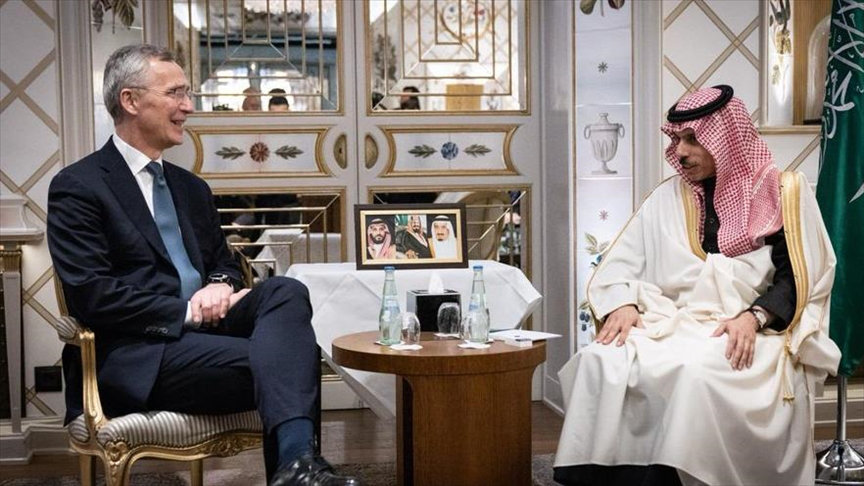
NATO Secretary-General Jens Stoltenberg (left) meeting with Saudi Foreign Minister Prince Faisal bin Farhan at the Munich Security Conference in Germany earlier this year. (X: @jensstoltenberg)
“We are very, very happy to build on that cooperation. We would be happy to open the door for a partnership if the Kingdom were interested. But again, the starting point is political dialogue.
“That took place during my visits with senior officials and during the secretary general’s visit. But I think most recently, at the sort of top level, when Secretary General Stoltenberg met Saudi Foreign Minister Prince Faisal bin Farhan at the Munich Security Conference in February, when they had a very good conversation on the margins.
“So, we are definitely very, very keen to develop the relationship and the dialogue with the Kingdom.”
